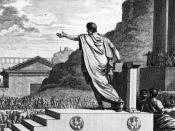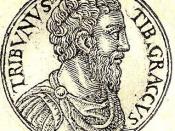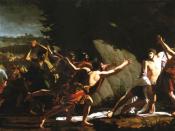The tribunate of Ancient Rome consisted of ten men elected for a one year term by the plebeians, who had to power to propose laws, summon the concilium plebis (Plebeian/People's Assembly) and gain resolutions from it, propose laws to the Senate, defend the people against the decisions of magistrates and veto any matters which they disagreed with. Although Rome had no written constitution, the role of the tribune was dictated by the mos maiorum - the tradition of ancestors - which all government members sought to adhere to and it was usual for tribunes to consult the Senate before using any of their powers . According to Polybius, a Greek historian 203-120BC, the basic function of the tribunate was "always to do what the People approves and above all to aim at the achievement of its desires" . However, the second and third centuries BC saw a vast expansion of the Roman Empire which placed stress on political and social institutions and individuals were able to wreck the established order and manipulate the system to fulfil their own ambitions .
It was thus that the tribunes Tiberius and Gaius Gracchus, Saturninus, Marius and Sulpicius Rufus drastically altered the way the tribunate functioned during the years 133-78BC, until it was all but abolished by Sulla.
The Gracchi brothers, Tiberius and Gaius, made unprecedented moves and significant reforms during their time as tribunes which were to dramatically change the role of the tribunate during the period of 133-121BC . Tiberius Gracchus was a plebeian tribune in 133BC, who instead of rising to power through the cursus honorum (the ladder of office someone with political ambition was expected to climb) sought to wield power by bypassing the Senate. Tiberius proposed a lex agraria, a law which limited holding of public land...


